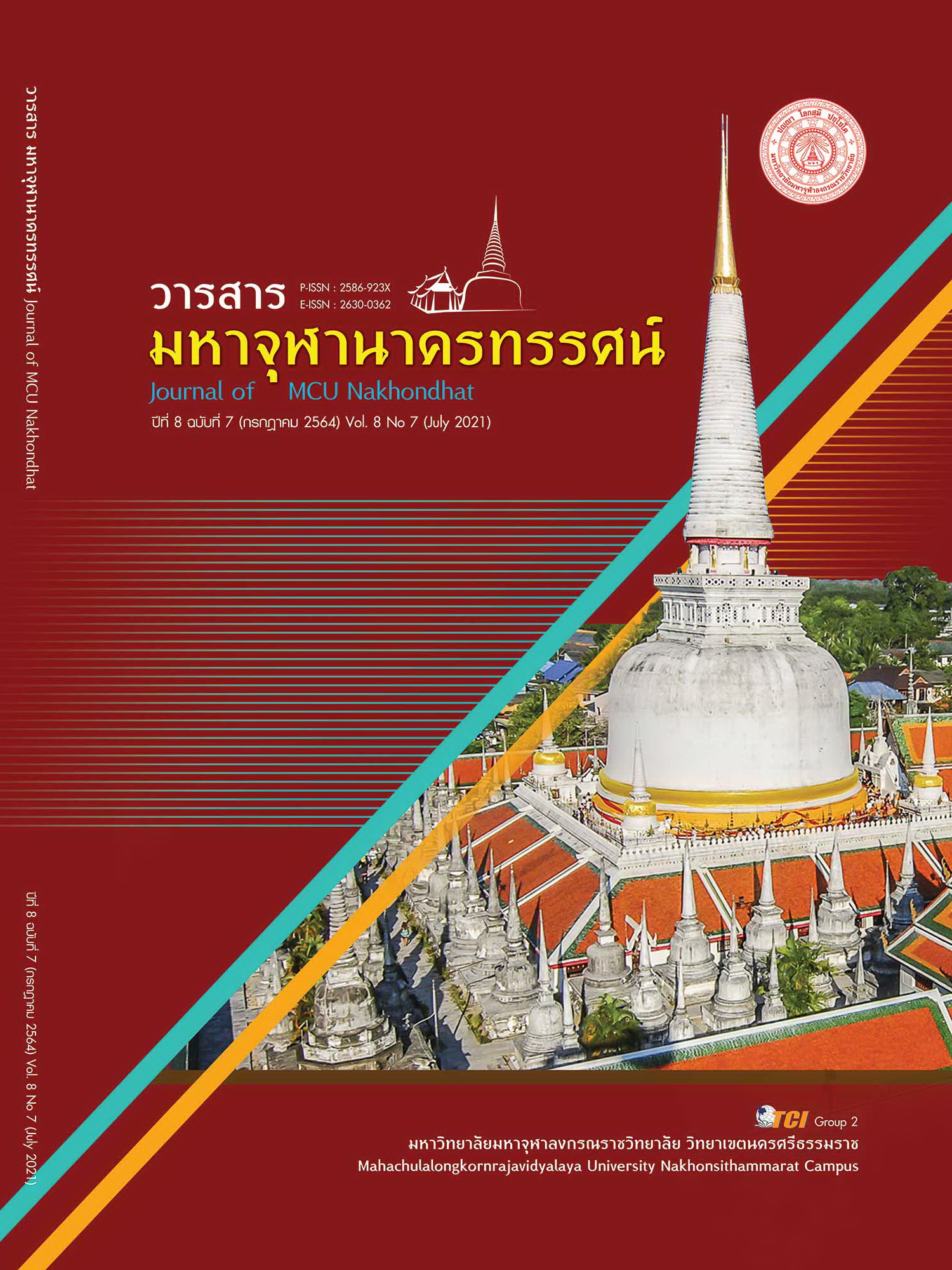SOCIAL DEVELOPMENT USING BUDDHIST BELIEFS
Main Article Content
Abstract
Social development based on the beliefs of Buddhist rituals in Thai society, despite their roots in Buddhism. But some people in society still believe in the mystery. Which is something that has been around for a long time in Thai society before until now In general, beliefs tend to have implications for the underlying social connections. And reflected in the form of various rituals, therefore, the Buddha Sana can contribute to the development of society, where various rituals are performed and able to develop society is Performing various rituals In Buddhism, there will be the cooperation of the people in society who come to join the rituals for the society to become one. Even so, there is always a belief in each person's part. And believe in different things Leading to the practice of the ritual according to the beliefs of each person And whether it is any type of ritual, it has the essence of enhancing goodness. And the purity of the thoughts of the participants of the ritual is fundamental. For example, worshiping or worshiping the jewels Which is an expression of faith in Buddhism to strengthen one's morale and prosperity Not for the invocation of the sacred Or making merit for dead relatives Regardless of the ritual of the Lord Buddha. Can develop society because of the Buddhist rituals It is the principle that society is harmonious and can help each other to create happiness in society.
Article Details
References
ชาญวิทย์ ปรีชาพาณิชพัฒนา. (2564). พรหมวิหาร 4. เรียกใช้เมื่อ 3 กุมภาพันธ์ 2564 จาก https://sites.google.com/site/metawatee/hlak-thrrm-thang-sasna/phrhm-wihar-4
ณัฐพงษ์ สังข์กลิ่นหอม. (2556). เรื่องความสำคัญของพิธีกรรมและพิธีกรรมทางศาสนา. เรียกใช้เมื่อ 3 กุมภาพันธ์ 2564 จาก https://sites.google.com/site/nathph ngssangkhklinhxmiom/khwam-hmay-khxng-phithikrrm-laea-sasna
ติน ปรัชญพฤทธิ์. (2555). การบริหารการพัฒนา : ความหมาย เนื้อหา แนวทางและปัญหา. (พิมพ์ครั้งที่ 13) กรุงเทพมหานคร: สำนักพิมพ์แห่งจุฬาลงกรณ์มหาวิทยาลัย.
นครเยอร์. (2564). ศาสนากับการดำเนินชีวิต. เรียกใช้เมื่อ 2 กุมภาพันธ์ 2564 จาก http://tripopyun.blogspot.com/2013/09/2.html
นางสาวพิมพิลัย หงษา. (2559). เรื่องงานพิธี คุณค่าและประโยชน์. เรียกใช้เมื่อ 2 กุมภาพันธ์ 2564 จาก https://sites.google.com/site/fon5481136057/hnwy-thi-6/6-3
พระธรรมปิฎก (ป.อ. ปยุตฺโต). (2542). พุทธธรรม. (ฉบับปรับปรุงและขยายความ). (พิมพ์ครั้งที่ 8).กรุงเทพมหานคร: โรงพิมพ์มหาจุฬาลงกรณราชวิทยาลัย.
พัชรินทร์ สิรสุนทร. (2556). แนวคิด ทฤษฎี เทคนิคและการประยุกต์เพื่อการพัฒนาสังคม. พิมพ์ครั้งที่ 1 กรุงเทพมหานคร: จุฬาลงกรณ์มหาวิทยาลัย.
พัทยา สายหู. (2544). กลไกของสังคม. พิมพ์ครั้งที่ 13 กรุงเทพมหานคร: จุฬาลงกรณ์มหาวิทยาลัย.
มหาวิทยาลัยรังสิต. (2540). วิชาอารยธรรมไทย. ใน เอกสารประกอบการสอน ปีการศึกษา2540. มหาวิทยาลัยรังสิต.
เมธีธรรมาภรณ์, (ประยูร ธมฺมจิตฺโต). (2535). พุทธศาสนากับปรัชญา. (พิมพ์ครั้งที่ 2). กรุงเทพมหานคร: โรงพิมพ์มหาจุฬาลงกรณ์ราชวิทยาลัย.


